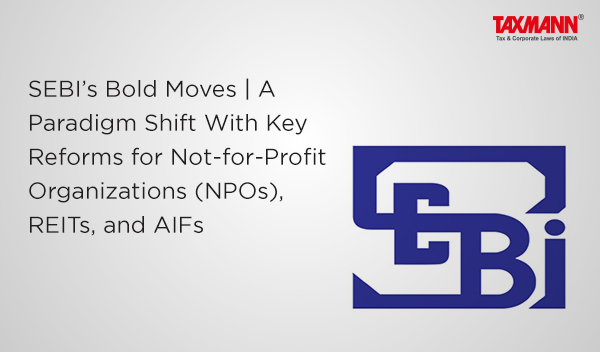SEBI’s Bold Moves | A Paradigm Shift With Key Reforms for Not-for-Profit Organizations (NPOs), REITs, and AIFs
- Blog|News|Company Law|
- 3 Min Read
- By Taxmann
- |
- Last Updated on 28 November, 2023

In its 203rd Board Meeting on November 25, 2023, the Securities Exchange Board of India (SEBI) approved several frameworks and amendments. These transformative measures encompass a spectrum of sectors, from providing impetus to Not-for-Profit Organizations (NPOs) on the Social Stock Exchange to introducing a new era for Small & Medium Real Estate Investment Trusts (SM REITs).
The SEBI’s initiatives also extend to Alternative Investment Funds (AIFs), introducing investor-focused reforms that emphasize compliance simplicity and fortification of investor safeguards. Let’s delve into the key highlights and implications of these groundbreaking regulatory changes.
1. Minimum Issue Size Slashed for NPOs’ Zero Coupon Instruments on Social Stock Exchange
With an objective to provide impetus to fund raising by Not for Profit Organizations (NPOs) on the SSEs, the SEBI has reduced the minimum issue size in case of public issuance of Zero Coupon Zero Principal Instruments (ZCZP) by NPOs on SSE from Rs. 1 Crore to Rs. 50 lakhs.
Further, the minimum application size for ZCZP public issuance by NPOs on SSE was reduced from Rs 2 lakh to Rs 10,000, encouraging broader participation, especially from retail investors. Also, the nomenclature of “Social Auditor” to be changed with “Social Impact Assessor” to provide comfort to NPOs and convey a positive approach towards the social sector.
2. Index Providers Set to Drive Transparency and Governance in Financial Benchmarks!
The Board has endorsed a regulatory framework for Index Providers, aiming to enhance transparency and accountability in the governance and administration of financial benchmarks within the securities market.
The forthcoming regulations will establish a structure for the registration of Index Providers licensing ‘Significant Indices,’ as notified by SEBI through objective criteria. Aligned with IOSCO Principles for Financial Benchmarks, this regulatory framework exclusively applies to ‘Significant Indices.’
3. SEBI Paves the Way for Small & Medium REITs
The Board has approved amendments to the SEBI (REIT) Regulations, 2014, introducing a regulatory framework to support Small & Medium REITs (SM REITs). The revised regulations set a minimum asset value of at least Rs. 50 crore for SM REITs, a significant departure from the Rs. 500 crore requirement for existing REITs.
Notably, SM REITs gain the flexibility to establish separate schemes for real estate asset ownership through special purpose vehicles constituted as companies. The regulatory framework greenlit by the Board for SM REITs includes provisions for the structure of SM REITs, the transition of existing structures meeting specified criteria, and the responsibilities of the investment manager.
Also, this encompasses criteria such as net worth, experience, and minimum unitholding requirements, along with considerations for investment conditions, minimum subscription, distribution norms, asset valuation, and more.
4. SEBI Unveils Investor-Focused Reforms for Alternative Investment Funds!
To enhance compliance simplicity and fortify investor safeguards in Alternative Investment Funds (AIFs), the Board has approved the following measures:
4.1 Dematerialization Requirement
Any new investment by an AIF, post-September 2024, must be held in dematerialized form. Existing investments are exempted, with exceptions for cases where:
- The investee company is legally obligated to facilitate dematerialization of its securities.
- The AIF, independently or with other SEBI registered intermediaries/entities mandated to hold investments in dematerialized form, exercises control over the investee company.
4.2 Custodian Appointment Mandate
The mandate for the appointment of a custodian, currently applicable to Category III AIFs and Category I and II AIFs with a corpus exceeding Rs. 500 Crore, is extended to all AIFs. AIFs have the flexibility to appoint a custodian associated with the manager or sponsor, subject to conditions akin to those outlined in SEBI (Mutual Funds) Regulations, 1996, for permitting a related party of a Mutual Fund sponsor to serve as its custodian. The Board acknowledges that the average cost of compliance for schemes falling under this mandate is approximately Rs. 88,000 per annum, based on an analysis of sample data.
Disclaimer: The content/information published on the website is only for general information of the user and shall not be construed as legal advice. While the Taxmann has exercised reasonable efforts to ensure the veracity of information/content published, Taxmann shall be under no liability in any manner whatsoever for incorrect information, if any.

Taxmann Publications has a dedicated in-house Research & Editorial Team. This team consists of a team of Chartered Accountants, Company Secretaries, and Lawyers. This team works under the guidance and supervision of editor-in-chief Mr Rakesh Bhargava.
The Research and Editorial Team is responsible for developing reliable and accurate content for the readers. The team follows the six-sigma approach to achieve the benchmark of zero error in its publications and research platforms. The team ensures that the following publication guidelines are thoroughly followed while developing the content:
- The statutory material is obtained only from the authorized and reliable sources
- All the latest developments in the judicial and legislative fields are covered
- Prepare the analytical write-ups on current, controversial, and important issues to help the readers to understand the concept and its implications
- Every content published by Taxmann is complete, accurate and lucid
- All evidence-based statements are supported with proper reference to Section, Circular No., Notification No. or citations
- The golden rules of grammar, style and consistency are thoroughly followed
- Font and size that’s easy to read and remain consistent across all imprint and digital publications are applied



 CA | CS | CMA
CA | CS | CMA
